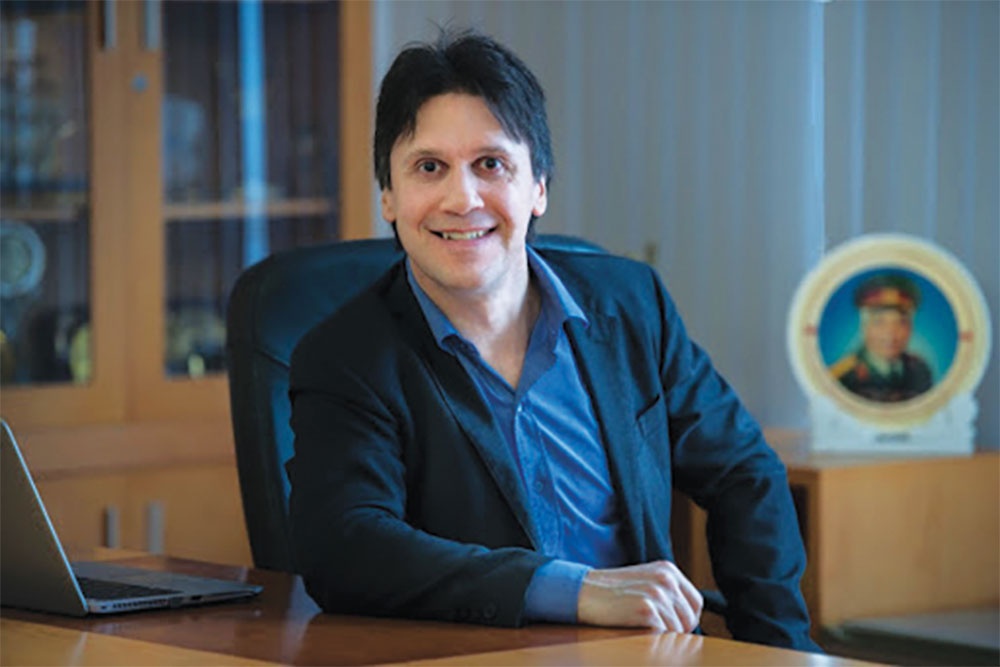Ericsson’s commitment to supporting the digital transformation of Vietnam
Having been in your current role since 2017, what are some of your highlights, especially in Vietnam?
I’ve thoroughly enjoyed every moment of working here, and it has clearly been the highlight of my 32-year professional career in the Ericsson world. The greatest honour and privilege has been the opportunity of working with the wonderful people of Ericsson and sharing time and experiences with the broader Vietnamese community.
 |
| Denis Brunetti, president of Ericsson in Vietnam, Myanmar, Cambodia, and Laos |
As Ericsson celebrates 30 years here, I’m proud of our contribution to Vietnam’s prosperity and amazing rise as a pre-eminent global investment destination of choice for the international business community. Through the increased high-tech foreign investment focus, growing digital economy, and the many free trade agreements that Vietnam has implemented, the country has transformed itself into an economy and a country that is the pride of ASEAN and indeed the world.
Through our 2G-4G and emerging 5G mobile networks, Ericsson has connected people across all parts of Vietnam, as well as enabling industries and the economy to increasingly transform into a thriving digital economy. Indeed, Ericsson has worked with mobile operators and service providers here to build the critical infrastructure that will underpin the government’s vision to raise the contribution of the digital economy to GDP to 30 per cent by 2030, with labour productivity rates reaching 7.5 per cent per annum by that same year.
We have also localised many senior management positions in Vietnam over the past several years, supporting the development of local leadership. In 2023 Vietnam will become one of Ericsson’s regional ‘Cloud Factories’, with many of our local engineers contributing to regional and global cloud project deployments moving forward.
You referred to how Ericsson has contributed to Vietnam’s digital transformation. How is progress and are you happy with Ericsson’s performance in the market?
Since 2017, Ericsson has increased its focus on supporting our mobile operator and service provider customers with mass 4G and commercial trial 5G infrastructure across the country, and particularly in high-growth and industrial areas that will eventually benefit from smart manufacturing efficiencies and sustained productivity gains.
The National Strategy for Digital Transformation and Industry 4.0, together with the Socioeconomic Development Plan for 2021-2030, clearly highlights the importance of digital transformation and the digital economy in driving Vietnam’s next wave of inclusive and sustained socioeconomic development.
Already today, Vietnam ranks in the top three countries in Southeast Asia in terms of the value of its digital economy. It also ranks at around 48th on the Global Innovation Index, significantly improving on-year. These achievements are due to Vietnam’s increased focus on mobile broadband digital infrastructure.
Vietnam wants to commercialise 5G in 2023 and call this the year of data. How will Ericsson’s plans in 2023 align with these strategies?
We project significant data growth in Vietnam, both on 4G and future 5G deployed networks, beginning in late 2023 and accelerating in 2024 onwards. We have seen significant data growth in South Korea and other markets that launched commercial 5G networks in recent years.
Initially, video content, social media, cloud gaming, and AR/VR applications will contribute to this high growth, with Industry 4.0 and other industry/business sector applications driving further growth in the coming years. This is especially so across smart manufacturing and agriculture, e-health and e-learning, smart logistics and transport, and also renewable energy.
In fact, 5G will help support the seamless integration of renewable energy sources like wind, hydro, and solar into the existing energy grid. Hence, Ericsson believes that the commercialisation of 5G will deliver triple bottom-line benefits to Vietnam – social, economic, and environmental.
What are your expectations from the legal framework for 5G, as well as development prospects here?
Ericsson places its full trust and confidence in the government’s strategic plans, legal frameworks, and mechanisms that are enacted and implemented. I believe the deeper we look into the past, the further we can see into the future, and the country has an extremely successful track record and history in driving a sustained and inclusive socioeconomic development journey.
Vietnam successfully launched 2G networks in 1994, a year after Ericsson opened its office here. Through that initial deployment, Vietnam connected people across all parts of the country for the first time. Whether they lived in urban, rural countryside, or mountainous minority areas, all people were able to enjoy the benefits of mobile communication. We did the same for 3G and 4G, and the journey will continue with 5G and beyond.
Can a comparison be made between the process of 5G commercialisation here and regional markets?
Every county and market has its own path and journey, and Vietnam is very well-placed as one of the most dynamic and attractive investment destinations with a fast-growing digital economy and strategic focus on digital transformation.
Ericsson fully supports and endorses this vision, and we are committed to helping Vietnam achieve this important ambition.
What the stars mean:
★ Poor ★ ★ Promising ★★★ Good ★★★★ Very good ★★★★★ Exceptional
Related Contents
Latest News
More News
- Masan Consumer names new deputy CEO to drive foods and beverages growth (February 23, 2026 | 20:52)
- Myriad risks ahead, but ones Vietnam can confront (February 20, 2026 | 15:02)
- Vietnam making the leap into AI and semiconductors (February 20, 2026 | 09:37)
- Funding must be activated for semiconductor success (February 20, 2026 | 09:20)
- Resilience as new benchmark for smarter infrastructure (February 19, 2026 | 20:35)
- A golden time to shine within ASEAN (February 19, 2026 | 20:22)
- Vietnam’s pivotal year for advancing sustainability (February 19, 2026 | 08:44)
- Strengthening the core role of industry and trade (February 19, 2026 | 08:35)
- Future orientations for healthcare improvements (February 19, 2026 | 08:29)
- Infrastructure orientations suitable for a new chapter (February 19, 2026 | 08:15)

 Tag:
Tag:

















 Mobile Version
Mobile Version